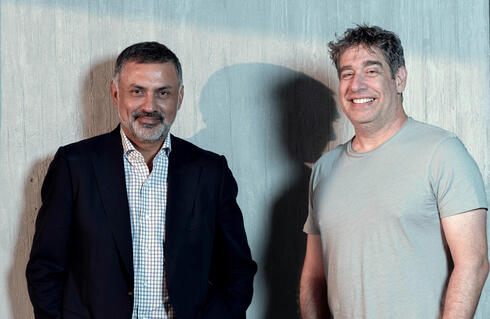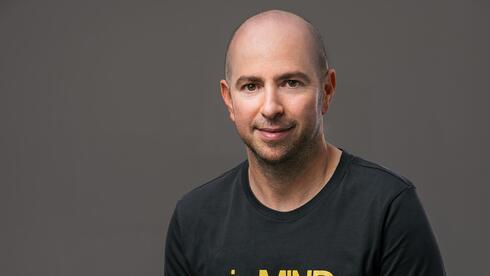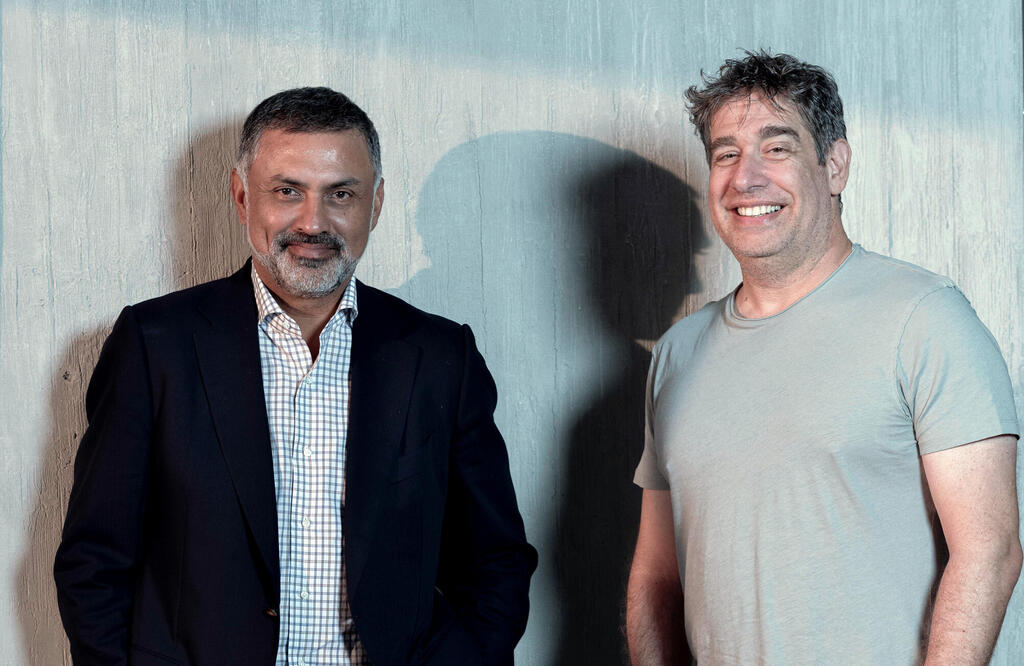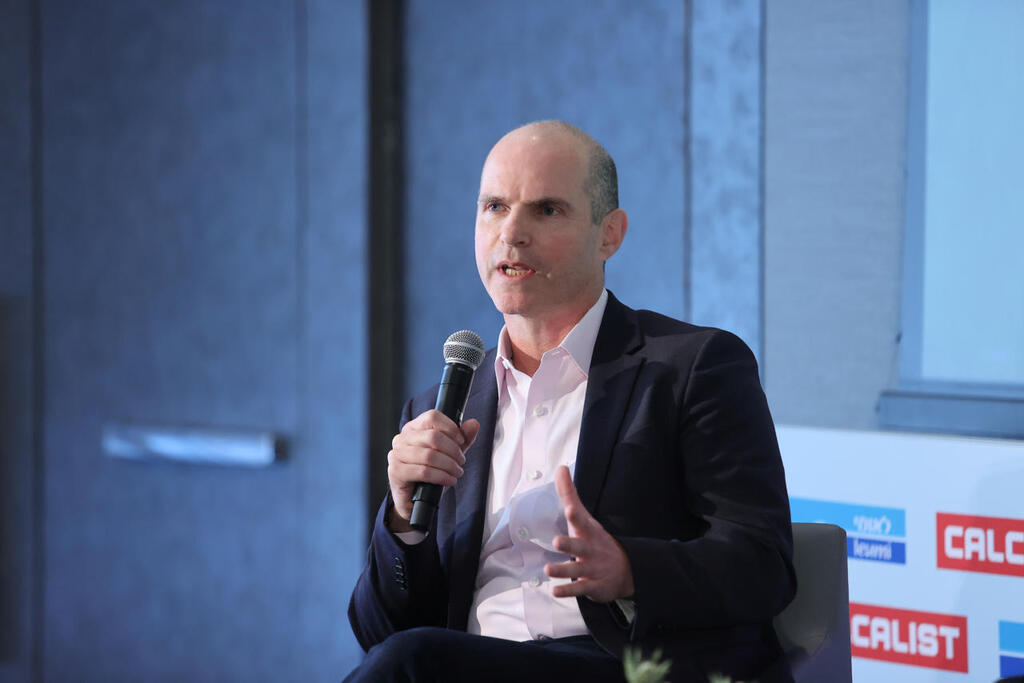
Palo Alto closing on $100 billion valuation as entire cyber ecosystem flourishes
The company founded by Nir Zuk is trading at a record value for a cybersecurity company, and Check Point and CyberArk are also at all-time highs. Although the cybersecurity sector as a whole is growing due to the increase in the scope of attacks and the change in regulations in the US, many Israeli companies are specifically benefitting due to their work with large organizations that are less affected by interest rates and their focus on comprehensive solutions
About a year ago, at the end of October 2022, Palo Alto Networks CEO Nikesh Arora stated in an interview with Calcalist that Palo Alto would be the first cybersecurity company to reach a value of $100 billion.
At that time, the company traded around a value of $50 billion, and it seemed that this was just another arrogant announcement by a head of a technology company, especially a CEO like Arora, who, in one of his previous positions, was Masayoshi Son's number 2 at SoftBank.
However, on Wednesday, Palo Alto closed at a market value of $98.96 billion, and even Arora is likely surprised by how quickly the company he manages, founded by the Israeli Nir Zuk, has reached this phenomenal value. Although Palo Alto started 2023 as a cyber heavyweight, that didn't stop it from jumping another 120% since then, bringing it to a historic record value, on the verge of that $100 billion promise.
Just to illustrate, even at its current market value, Palo Alto is larger than the 12 largest companies on the Tel Aviv Stock Exchange, including Nice, Bank Leumi, Bank Hapoalim, Teva, and Elbit.
But Palo Alto is not alone in the game. Quite surprisingly, a large number of Israeli cybersecurity companies have also reached a historic high in recent days. This, despite the fear of serious damage to the reputation of Israeli cyber just two months ago, right after the murderous attack by Hamas on October 7.
At conferences in the U.S., investors and competitors were concerned about how the famous Israeli technology might have failed to warn of the catastrophic plans of Hamas. Some feared negative consequences for the Israeli cyber brand built over the past decade. However, two months after the attack, and with the war still in progress, veteran companies like Check Point and CyberArk are also at all-time highs, with Varonis not far behind. Only SentinelOne, the largest cyber IPO in history, is still far from the record value of almost $20 billion at which it traded in 2021, although its stock has also risen recently.
Check Point and CyberArk are the big surprises of the year, as they are two old companies that were not the big stars during the high tide of 2021. However, CyberArk jumped 61% from the beginning of 2023, bringing it to a value of $8.5 billion. In contrast, Check Point settled for a 17% increase, a lackluster return compared to Nasdaq, which rose by 36%, but it also reached a historical record value of $17.5 billion.
This is not an Israeli phenomenon only. In the last two months, most companies in the cyber sector, including CrowdStrike, and Zscaler, together with the Nasdaq index, have also ended the year with a nice double-digit increase, although they still haven't been able to restore their historical record levels. Unlike the Israeli companies, some of which were relatively undervalued, the American stars took off too high in terms of growth multipliers in the high years, and therefore, their growth potential is more limited. This is mainly due to the fact that despite mostly good reports from the cyber companies and optimistic forecasts, the abnormal growth rates of 2020 and 2021 will not return soon.
What is pushing the cyber companies upward at a time when the macro-economic environment is still challenging, and organizations have not yet loosened their grip on budgets? There are several factors in the cyber market, some of which work overwhelmingly for the benefit of all players, and others separate the companies that correctly identified the direction and implemented the strategy.
The industry receives a general boost from the proliferation of cyber attacks as there is more chaos in the world. The scope of attacks has increased since the war between Russia and Ukraine, and also the war in Gaza and the involvement of other parties trying to wreak havoc lead to more frequent cyber attacks. Organizations in Israel feel this very well in the last two months, but this is also true for the rest of the world. Just a week ago, the U.S. and Israel issued a warning about the activity of Iranian hackers trying to damage vital infrastructure in the U.S.
Another general factor for the increase in the value of cyber companies is the guidance of the U.S. Securities and Exchange Commission (SEC), which will come into effect this Monday and will require comprehensive and much faster reporting on cyber incidents in companies. They will be required to report a cyber incident within only four days from the moment of discovery. The current reports will also require much more extensive detail on the cyber protection policy and the precautions taken. In the cyber industry, there is talk of the new requirements putting pressure on the boards of directors, who understand that the responsibility is going to shift to them and go beyond the boundaries of the office of the CISO, who was responsible for this until now.
"This is an acceleration of all the processes that existed until now in the industry and it causes organizations to invest more in being able to understand what their most sensitive assets are and where the exposures are. They also need to know who in the organization has access to what," Udi Mokady, founder and chairman of CyberArk, told Calcalist.
Beyond the multitude of attacks and the strict reporting requirements, technological developments also contribute to the strong momentum in cyber. It started with the cloud, the transition to which opened up entire categories in the industry and continued with the dramatic technological breakthroughs in artificial intelligence. Generative artificial intelligence opens up new and quite frightening worlds for hackers and, as a result, also requires preparation and investment from the companies that provide the protection.
Along with the vectors that push all cyber companies, there are several trends that separate the companies that were able to identify them ahead of time versus those that missed it. Here it is possible to mention positively the majority of Israeli cyber companies, which benefit from the fact that they historically work with larger organizations and are not based on small and medium-sized businesses only. They also made an effort to develop a platform that brings together a series of products and not one narrow solution. Last summer, it was Palo Alto, which officially became the main tone-setter in the industry, announcing that the era of point solutions was over and the era of platforms began. One could suspect the motives of Palo Alto, as a company that advocates an acquisition strategy that puts it in almost every area of the cyber market. However, also in CyberArk, which operates precisely in one of the few areas in which Palo Alto does not have a presence - identity management in the organization - they are talking about a platform. The security managers are tired; they don't have the attention and the budgets of old to try small solutions, CyberArk believes.
Incidentally, this is also the reason why the Israeli Wiz, still a young private company, started talking about acquisitions and a week ago even purchased, for the first time in its history, an Israeli startup. Another Israeli company, Check Point, made one of the biggest transactions in Israel last year, with the purchase of Perimeter 81 for half a billion dollars, to expand its solution to the SASE market. In the third-quarter summary published by the investment bank Oppenheimer & Co. on the cyber market, the analyst Sergey Vastchenok writes about the abandonment of niche providers in favor of platforms. This trend works mainly in favor of Palo Alto, but also in favor of CyberArk, which made a transformation with the transition to the SaaS model and with the expansion of its product portfolio to a broad platform in the field of identity management. This subfield is gaining renewed interest because some of the biggest cyber hacks in recent times have been achieved by impersonating employees.
For example, the attack on the MGM casinos in Vegas three months ago, which paralyzed the systems to the extent that the hotels had to do manual check-in and only accept cash payments, was done after the attackers learned on social media all about one of the employees, called MGM's call center under his identity, and asked to change his password to the system. From there, the road was paved. The estimated cost of the attack to MGM is $100 million.
One company trying to imitate CyberArk is Varonis. The veteran firm developed a solution to protect against unauthorized access to files in corporate information systems, and is currently trying to move to a SaaS model, as CyberArk has done successfully in the last two years. At the same time, it adapts its technology to the worlds of the cloud, similar to Check Point's effort in recent years.
Although the third quarter was a bit weak for both Check Point and Palo Alto, and both companies talked about the lengthening of sales cycles and difficulty in closing deals, the wide distribution of their customers allows them to continue growing. Check Point, by the way, is still the cyber company that is growing at the slowest rate among its competitors but is benefiting from the changing tastes of investors in favor of profitable growth. Gil Shwed’s company is the most profitable of the cyber companies but trades at the lowest sales multiple.
The strong end of the year for cyber shares has broad and interesting implications for the startup market in the field. Almost all the major cyber companies have made acquisitions in the last year. Palo Alto is the leader with the purchase of Talon and Dig for almost a billion dollars. Check Point purchased Perimeter 81, CrowdStrike acquired Bionic for $350 million and Tenable bought Ermetic for $265 million. This trend is expected to continue in 2024 and encourage venture capital funds and private investment funds to pour money into new cyber startups because the exit horizon is becoming clearer and brighter than ever.
















